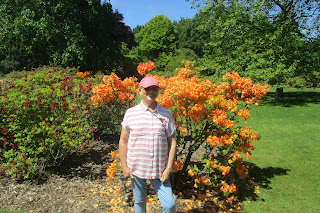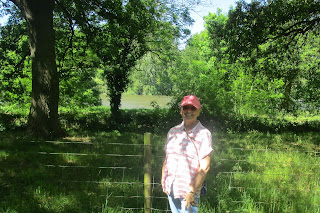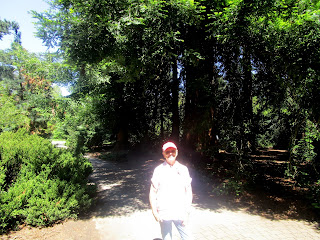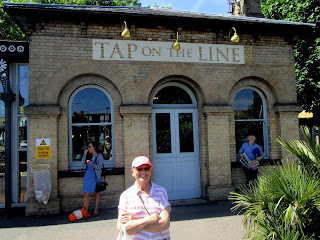A day at Kew Gardens

The Palm House and Lake leading to Victoria Gate
 | |
| Type | Botanical |
|---|---|
| Location | London Borough of Richmond upon Thames, England |
| Coordinates | 51°28.480′N 0°17.728′WCoordinates: 51°28.480′N 0°17.728′W |
| Area | 121 hectares (300 acres) |
| Opened | 1759 |
| Visitors | more than 1.35 million per year |
| Species | > 30,000 |
| Website | www |
| UNESCO World Heritage Site | |
| Location | United Kingdom |
| Criteria | (ii), (iii), (iv) |
| Reference | 1084 |
| Inscription | 2003 (27th Session) |
| Website | www |

. Kew garden is so huge that we only saw part of it. There were corners that we never made it to. Does this mean we get to go back another day?










The Campanile tower at the Royal Botanic Gardens of Kew in London , England was orignally built to disguise the vents for the palm house.
The Palm House

The Madagascar periwinkle (a rosy color) produces a sap that is used in treating Leukemia and Hodgkin's disease and other cancers. Catharanthus roseus (L.) G.Don
We are so familiar with the light purple of periwinkle in the western United States. We had
both vinca minor and vinca major growing in our yard. One of the first plants to flower in the spring.
Palm House in the background
Azalea flowers were fading and falling off the plants.
This is a seed pod from a magnolia tree. Inside is a hard seed almost as big as the outer covering.
Bamboo garden
This traditional Japanese farmhouse was given to the gardens in 1891 with 1200 different of species of bamboo by Japan. Bamboo is part of the grass family but is a rapidly growing wood. Bamboo has been used for many purposes but recently bamboo has become a popular wood for floors in homes.

The Thames flowing next to the gardens.
A structure on the other side of the river that we could not identify.
Metropolitan Drinking Fountain and Cattle
Trough Association
Treehouse - closed when we were there but there is a 5 pound fee to go into it.

We could hear him long before we saw him. Since we are familiar with the peacocks at
Holland Park, his cry was recognizable. Not a goose nor a duck.
I had to come to London and Kew Gardens to see a giant sequoia or redwood
Example of how large a redwood can be.
King William's Temple and Mound
It was occupied by a class of girls sitting in the gloom eating lunch while the boys and an
instructor sat on the portico discussing issues such as how food is processed.
Its Tuscan porticos contain iron plaques commemorating British military victories from 1760 to 1815.
They are now green and difficult to read. I wonder if they are copper that has changed its patina over the years. The temple was built in 1837 and today is set among plants from the Mediterranean region.
This is one of two sundials which when accompanied by two equation clocks established
Greenwich time. Its purpose was to serve as a reliable source for regulating clocks.
Thomas Tompion was an English clockmaker, watchmaker, and mechanician who is still regarded to this day as the Father of English Clockmaking. Wikipedia
Plants from Mediterranean environments
An unusual water fountain. We hope it is potable water.
Push the button down and water flows from the man's mouth.
Italian Cypress in the background
The Temple of Bellona close to the Victoria Gate
The names of the British and Hanoverian regiments who fought in the seven years war (known as the French and Indian war in the United States) are inscribed on the interior walls of the temple. It was constructed in 1760 by Sir William Chambers. It was moved to its present location early in the 19th century. Surprisingly this small temple is built from wood. A rare survivor of wood construction enduring over 200 years.
Street outside of the Kew Gardens tube station. We sat on a bench and
ate sandwiches we had bought at Tesco.
This underground station (which is above ground) looks exactly as I would imagine any
station in a small English town.



























































No comments:
Post a Comment